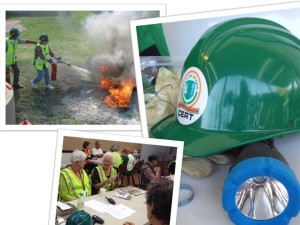A Thank You Is Due!
I think I know why people become survivalists: paranoia, healthy skepticism, sturdy pioneering genes. But what makes people JOIN IN WITH NEIGHBORS to prepare for emergencies?
After all, willingness to prepare to help others is really quite different from preparing to protect yourself.
So a couple of weeks ago I started a campaign to find out. I sent out a broadcast message to all the people on my Emergency Plan Guide list, and posted an inquiry on one of my groups at LinkedIn:
“What drives you to join CERT?”
I want to thank all the people who responded! And for those who saw the message but didn’t respond, I thought it would be worthwhile to share
 Some of the answers I got.
Some of the answers I got.
Here are the themes that came through. Perhaps you’ll discover some that describe why YOU are interested and active.
1. Driven/shocked into action by news coverage
One person wrote that when he saw what happened after Hurricane Katrina hit, he could no longer stand by and watch another disaster go down. Joining CERT seemed the best way he could offer up his assistance. I’ve heard the same thoughts expressed by people who watched Hurricane Sandy come . . .and stay and stay.
2. Living the volunteer lifestyle
I heard from California, New Jersey and Virginia about people taking CERT training and continuing their support for CERT as part of a lifelong commitment to volunteerism. Every one of these people volunteers in other areas of their lives, too. And as one reader put it, “Those who give back are almost always the Good people in town.”
3. Looking for camaraderie
The teamwork that characterizes many CERT activities is missing in a lot of lives these days. Ex-military, ex-boy scout, retired sales manager — once you’ve experienced the satisfaction of leading and being part of a team, it holds a powerful attraction. CERT fits the leadership/teamwork bill.
4. Fear of not knowing what to do
Outsiders tend to link CERT only with natural disasters like earthquakes and hurricanes. What we discover is that CERT training tends to make people aware of how to respond to a whole range of emergencies: flooded streets, active shooter events, household fires, natural gas leaks, after-disaster psychological trauma, you name it. And if you have a particular concern, you can bring it up and get unofficial advice, for sure.
5. CERT as a requirement
I heard from one person that CERT was required for a particular Boy Scouts of America certification, and from another person that his employer told him to get certified. Works for me! (Once you have the training, you aren’t going to forget it!)
6. Attracted by the gear
CERT trainees come out of the course with some basic stuff: a bag, helmet, flashlight, vest, goggles, dust mask. Most graduates immediately begin to add to their kit: better flashlight, a multi-tool, a helmet lamp. The ultimate, of course, is having a radio. While official CERT teams are assigned radios for events, even neighborhood groups (like ours) set up entire radio networks with FRS/GMRS radios (walkie-talkies). Some people love becoming experts with the technology!
7. Make the community a better/safer place
Only some people realize that the REAL first responders are your neighbors. These people want to spread more knowledge, more awareness and more “empowerment” as a way to improve the community. (I didn’t get a scientific response, but what I did get on this topic came from young people and older people, not from “people in the middle.” Does this mean anything?)
Did you find your reason in this list?
Or are you committed to preparing for another reason altogether? Let me know!
My goal is to use this valuable information to reach more people in my own community – and perhaps you can use it to reach out to your neighbors, too. The more we can share good ideas, the safer we all will be.
Virginia
Your Emergency Plan Guide Team
Don't miss a single Advisory.
Thank you for subscribing.
Something went wrong.
